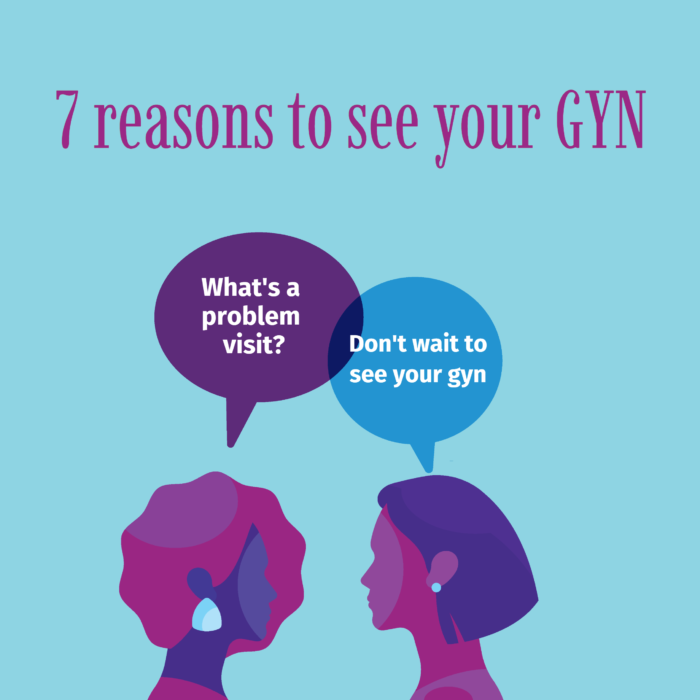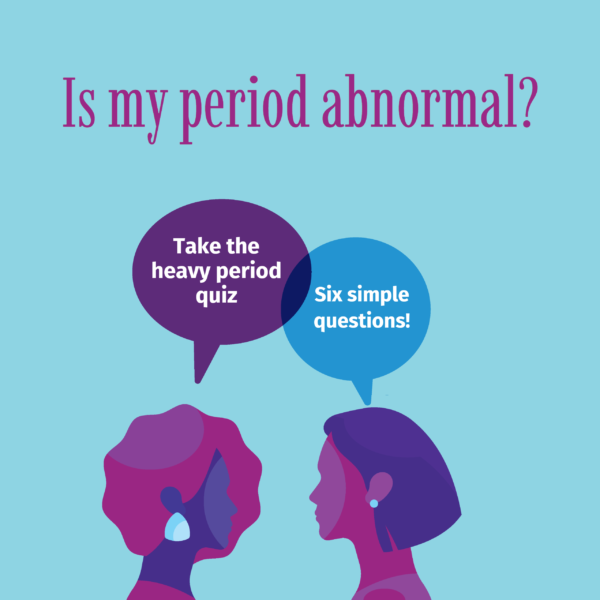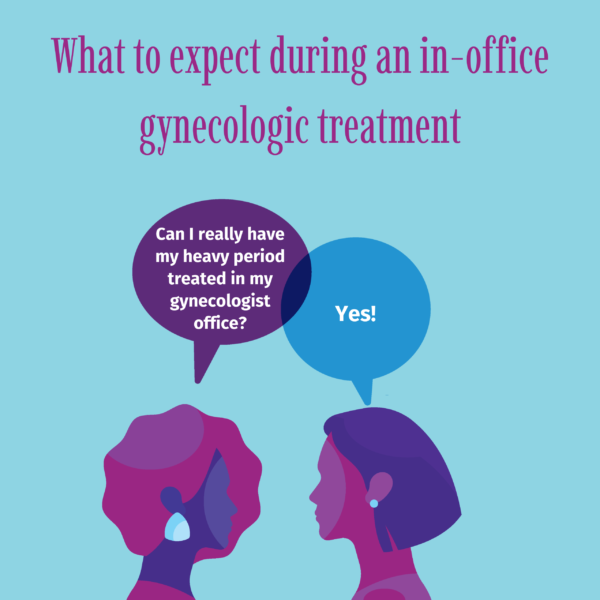7 reasons you shouldn’t wait to see your GYN
Unsure if you should make that call? Our team of women’s health educators breaks it down so that you have what you need to know regarding women’s wellness exams.
Let’s be real–When scheduling a woman’s exam, none of it is fun. We hear you. None of it! From calling in the appointment to climbing up on the exam table, we really just want the appointment to be over. All of those places we consider private suddenly feel, well, completely exposed. Feeling a little anxious when scheduling a visit with your gynecologist (GYN) is perfectly normal. Yet, it is so important to both 1) stay on track with your annual well-woman visits and 2) pay attention to those symptoms that would require a separate visit or a problem visit. While both types of visits are equally important, they differ in many ways. First things first: Let’s review some definitions so that we’re clear on what is what. Then, we’ll share the 7 signs that justify a visit outside of your regular annual in a comprehensive list put together by our team of women’s health educators for young adults to women post-menopause.
The well-woman annual and the problem visit are both critical to maintaining a healthy lifestyle and minimizing health risks. GYNs recommend that all women schedule and keep current on their annual exams. The annual well-woman visit is preventative in nature and includes a breast exam, a pelvic exam, and a Pap smear. It will review family history, health habits, and goals. This is also the appointment where general family planning can be discussed.
The problem visit is an entirely different visit. Many women want to include the problem exam at their annual preventive visit. Unfortunately, these visits cannot be scheduled together, due to the time it takes to have this discussion and the need for your doctor to stay on time for their other patients. The problem visit should be scheduled if you notice something abnormal or out of the ordinary. But what’s “abnormal,” and what’s “out of the ordinary”?
Here are some clear signs and symptoms that indicate you should not wait for your annual but rather schedule a problem visit with your GYN:
7 Reasons to Schedule a Problem-Visit
1) Vulvar abnormalities – Any discomfort, discharge, or abnormal appearance in the structure of the Vulva is a reason for concern. According to The American College of Obstetricians and Gynecologists (ACOG) you should visit your GYN or healthcare provider if you see changes on the skin of the vulva or if you have itching, burning, or pain.1 Any concern for infection, including bacterial or yeast, is also a reason to schedule an appointment.
2) Sexual activity – Pain during sexual intercourse can be a warning sign of many gynecologic conditions.2 Pain in the vaginal area can indicate anything from a skin condition to inflammation of the vagina. It could also indicate a sexually transmitted infection (STI). All of these conditions are most easily treated when discovered and diagnosed in the early stages. Anyone who has sexual contact is at risk of an STI. If there is ever a reason for concern, a problem visit should be scheduled immediately.
3) Breasts – Self-awareness is important when it comes to your breasts. While a lump will be an obvious sign, there are many other indicators that you might have a problem. If you notice pain in your breasts or underarms, this is cause for concern. Pay attention to irregularities in your breast(s), including changes to appearance and shape. Also, nipple discharge in one or both breasts can indicate a benign breast condition and should be checked by a GYN.
4) Pelvic Pain or painful periods – Most women have at least some pain associated with menstruation each month. Problem or abnormal symptoms include menstrual cramps that disrupt your life, progressively worsen, or severe menstrual cramps after age 25.3 If you find yourself missing work, the gym, get-togethers, and more, it is time to schedule a problem visit with a healthcare provider.
5) Infertility – The Mayo Clinic recommends that you do not schedule a problem visit for infertility unless you have been trying regularly to get pregnant for at least one year. They recommend women see their doctor if they are 35 years or older and have been trying to conceive for over six months or for women over the age of 40. Other reasons include known fertility problems, prior miscarriages, prior cancer treatment, prior diagnosis of a pelvic inflammatory disease, or irregular periods.4 Infertility can be caused by ovulation disorders, endometriosis, and fibroids. It is important to see a doctor if you meet any of the criteria above.
6) Abnormal Uterine Bleeding – One-third of outpatient visits to the gynecologist are for AUB.5 Excessive bleeding is bleeding that requires more than 16 regular flow tampons per period. Abnormal Uterine Bleeding (AUB) may cause dizziness or faint feeling due to loss of blood. AUB also includes bleeding beyond 7 days per menstrual cycle. Periods should not come more often than every 21 days or less often than every 35 days6. AUB can be an indicator of other conditions such as fibroids and more. If you are experiencing any of these symptoms, you should schedule a visit with your GYN.
7) Postmenopausal bleeding – If you are in your 40s and haven’t had your period for 12 months, you are likely in menopause7. Vaginal bleeding after menopause is not normal and should be evaluated by a GYN. It could be harmless, but it could also indicate certain cancers, endometrial or vaginal atrophy, an infection, polyps, or fibroids, to name a few8. You should schedule a problem visit if you have any concerns.
So now that you know some common signs and symptoms, it is important that we point out that this list is not all-inclusive. It would be impossible for us to point out every single symptom to warrant a problem visit. The best thing you can do is listen to your body. Shelly Spicer, Minerva Surgical Uterine Health Clinical Educator, explains, “It’s best to make a problem appointment any time you are concerned.” The good news is that doctors typically have more room in their schedules for problem visits, meaning they are more readily available. She encourages women to make the call no matter how long they’ve put it off, “Even if you’re unsure or you’ve pushed the problem off for a year or longer, call your doctor and make an appointment.”
“Women should come to these visits as they are. Your healthcare provider doesn’t care if you’re currently bleeding, if you’ve showered, or about your shave pattern. Just show up as you are,” explains Shonna Bates, Women’s Health Nurse Practitioner. There are many great women’s health providers out there, including one that is right for you. So take that long deep breath (c’mon, do it with us)…in… and out… and make time for yourself. You deserve it.
Visit our GYN finder to find a GYN in your area:
Want to meet our amazing team of uterine health educators? Check out their latest podcast, Time to Talk… Period, as they interview Women’s Health Practitioner Shonna Bates. Listen to a raw and unfiltered conversation on common myths in women’s health, GYN visits, the stigma surrounding abnormal uterine bleeding, and advice on how to take charge of your health and get back to life!
Results and patient experience may vary. Talk to your doctor about the right treatment for you.
- The American College of Obstetricians and Gynecologists.( 2022 ) The Disorders of the Vulva: Common Causes of Vulvar Pain, Burning, and Itching acog.org. Accessed date August 24, 2022. https://www.acog.org/womens-health/faqs/disorders-of-the-vulva-common-causes-of-vulvar-pain-burning-and-itching
- The American College of Obstetricians and Gynecologists.( 2022 ) When Sex Is Painful acog.org. Accessed date August 24, 2022. https://www.acog.org/womens-health/faqs/when-sex-is-painful
- Mayo Clinic.( 2022 ) Menstrual Cramps. mayoclinic.org. Accessed date August 24, 2022. https://www.mayoclinic.org/diseases-conditions/menstrual-cramps/symptoms-causes/syc-20374938#:~:text=Symptoms%20of%20menstrual%20cramps%20include,in%202%20to%203%20days
- Mayo Clinic. ( 2022 ) Infertility. mayoclinic.org. Accessed date August 24, 2022. https://www.mayoclinic.org/diseases-conditions/infertility/symptoms-causes/syc-20354317
- Davis E, Sparzak PB. Abnormal Uterine Bleeding. [Updated 2022 Feb 10]. In: StatPearls [Internet]. Treasure Island (FL): StatPearls Publishing; 2022 Jan. Accessed date August 24, 2022. https://www.ncbi.nlm.nih.gov/books/NBK532913/
- Abnormal uterine bleeding. ACOG. (2021, December). Accessed date August 24, 2022, from https://www.acog.org/womens-health/faqs/abnormal-uterine-bleeding
- National Institute of Health. What is menopause? National Institute on Aging. Accessed date August 24, 2022. https://www.nia.nih.gov/health/what-menopause
- Cleveland Clinic.( 2022 ) Postmenopausal Bleeding. my.clevlandclinic.org. Accessed date August 24, 2022. https://my.clevelandclinic.org/health/diseases/21549-postmenopausal-bleeding#diagnosis-and-tests
K0196 Rev. A




